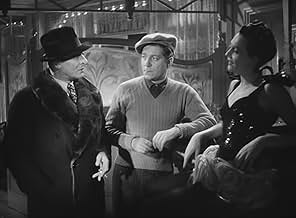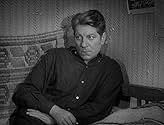CALIFICACIÓN DE IMDb
7.7/10
8.7 k
TU CALIFICACIÓN
Agrega una trama en tu idiomaAfter committing a murder, a man locks himself in his apartment and recollects the events that led him to the killing.After committing a murder, a man locks himself in his apartment and recollects the events that led him to the killing.After committing a murder, a man locks himself in his apartment and recollects the events that led him to the killing.
- Premios
- 1 nominación en total
René Génin
- Le concierge
- (as Genin)
Arthur Devère
- Mr. Gerbois
- (as Arthur Devere)
René Bergeron
- Le patron du café
- (as Bergeron)
Marcel Pérès
- Paulo
- (as Peres)
Annie Cariel
- Une locataire
- (sin créditos)
Georges Douking
- L'aveugle
- (sin créditos)
Georges Gosset
- Un agent
- (sin créditos)
- Dirección
- Guionistas
- Todo el elenco y el equipo
- Producción, taquilla y más en IMDbPro
Opiniones destacadas
That was one of the last French masterpieces of the thirties just before the war.Marcel Carné was accused of pessimism and the movie was quickly forbidden by the military censorship that used to say in 1940:"if we've lost the war,blame it on "Quai des Brumes""(Carné's precedent movie.The director answered:"you do not blame a barometer for the storm"). "Le jour se lève " is,if it's possible,darker than its predecessor. From the very beginning,the hero,a good guy (Gabin) is doomed,his fate is already sealed,because the tragedy has already happened .That's why the movie is a long flashback.The memories are brought back on the screen with an astounding virtuosity by some elements of the set (the teddy bear for instance).Only three main characters outside that of Gabin,the evil one (Berry who was to play the devil in "les visiteurs du soir "1942),the lucid one (Arletty) and the ambiguous one (Jacqueline Laurent).The latter provides
the only flaw of the movie:Laurent acts Françoise as the innocent pure girl,however Carné leaves no doubt about her relations with Berry. A remake was made by Anatole Litvak with Henry Fonda ,Barbara Bel Geddes and Ann Dvorak (who must have been studying Arletty's acting for a long while),called "the long night" with an absurd happy end. Needless to say,it's the French Carné movie that you've got to see!
the only flaw of the movie:Laurent acts Françoise as the innocent pure girl,however Carné leaves no doubt about her relations with Berry. A remake was made by Anatole Litvak with Henry Fonda ,Barbara Bel Geddes and Ann Dvorak (who must have been studying Arletty's acting for a long while),called "the long night" with an absurd happy end. Needless to say,it's the French Carné movie that you've got to see!
There is something so lyrical about the tale of the doomed François portrayed by the great Jean Gabin that even in its hardest luck moments you feel you are watching poetry in motion.
In addition, Le Jour se Leve is a character study with all the contradictions that tend to go with pained souls like François' - except that there is a further depth that renders the film quite universal, a depth made of little moments in human relationships and the flaws that gently emerge but only renders the humans involved more endearing.
Still, all that glitters is not gold: the apparently pure Françoise has actually been bedded by M. Valentin (Berry); and the police are more interested in getting their man than in saving him.
The direction is precise and inspired, resorting to the then much used flashback technique but never allowing it to dominate the film.
The photography - well, it is gorgeous and it gives the film its expressionistic ambiance. Finally, Gabin - one of the greatest actors ever in one of his greatest roles. Need one say more?
The ending can be predicted from the moment François kills a visitor in his apartment but that aside it is a film full of cinematographic treasures, acting to gape at, and a quality of direction that is seldom seen these days. A must see for anyone who cares about movies.
In addition, Le Jour se Leve is a character study with all the contradictions that tend to go with pained souls like François' - except that there is a further depth that renders the film quite universal, a depth made of little moments in human relationships and the flaws that gently emerge but only renders the humans involved more endearing.
Still, all that glitters is not gold: the apparently pure Françoise has actually been bedded by M. Valentin (Berry); and the police are more interested in getting their man than in saving him.
The direction is precise and inspired, resorting to the then much used flashback technique but never allowing it to dominate the film.
The photography - well, it is gorgeous and it gives the film its expressionistic ambiance. Finally, Gabin - one of the greatest actors ever in one of his greatest roles. Need one say more?
The ending can be predicted from the moment François kills a visitor in his apartment but that aside it is a film full of cinematographic treasures, acting to gape at, and a quality of direction that is seldom seen these days. A must see for anyone who cares about movies.
sentimental, far to be great, almost common. but seductive under the science of Carne to give delicate nuances to flash backs, to transform scenes in little gems. and, in same measure, the art of Prevert to transform each detail in a precise piece of puzzle. a film about love and innocence. about a kind of Mephisto - remarkable performance of Berry - and delicate lights of role in Jacqueline Laurent performance. but, in many aspects, a film of Arletty and Jean Gabin. not a surprise. the names of director and scriptwriter are basic guarantees for a remarkable work. but, after so many years, like many other films," Le jour se leve" has more seductive sparkles and great profound value.
A fantastic film, which plays with the emotions of the spectator while stunningly portraying the feelings of a pent-up man whose end echoes his pent-up life in the city. The film is beautifully shot in black and white and is a perfect example of French realism, with a modernist time disorientation tossed in for good measure. I found the performances by Jean Gabin and a showgirl with whom he gets involved (played by Arletty)to be strong, portrayed with a kind of hopeless, clutching pathos. Worth it simply for the beautifully constructed final shot.
We see a man shot; who he is and why we don't know. The murderer has locked himself inside his room. Police are forced to shoot in, trying to get him to surrender. The story then proceeds in flashback.
Marcel Carné directs this famous French film starring Jean Gabin. The two had worked together the previous year on "Le quai des brumes", a film well known then and now. If you are unfamiliar with Gabin, he was to the late 1930's in France what Bogey would be shortly in America, only Bogey with a soupçon of Cagney. More animated than Bogart, but less than Cagney with his agile song-and-dance-man side. A tough guy who's actually a good guy.
Now, a soft-hearted tough guy who's surrounded by police -- that could also describe Bogart's breakthrough film, "High Sierra", from 1941, and perhaps there is some superficial similarity.
However, this story is mostly a tale of love affairs and working class life -- that's really where its interest lies. There's a real sympathy here for the common man, when even a modest house on a rutted street would seem beyond his reach.
This film's original reputation may have been based at least in part on its Gallic openness about sexual matters. It's quite outré by the Anglo-Saxon standards of 1939. Regardless, the justly celebrated "Le jour se lève" has a poetic quality overall, and a memorably ironic final shot of the kind we don't seem to see quite often enough anymore.
Marcel Carné directs this famous French film starring Jean Gabin. The two had worked together the previous year on "Le quai des brumes", a film well known then and now. If you are unfamiliar with Gabin, he was to the late 1930's in France what Bogey would be shortly in America, only Bogey with a soupçon of Cagney. More animated than Bogart, but less than Cagney with his agile song-and-dance-man side. A tough guy who's actually a good guy.
Now, a soft-hearted tough guy who's surrounded by police -- that could also describe Bogart's breakthrough film, "High Sierra", from 1941, and perhaps there is some superficial similarity.
However, this story is mostly a tale of love affairs and working class life -- that's really where its interest lies. There's a real sympathy here for the common man, when even a modest house on a rutted street would seem beyond his reach.
This film's original reputation may have been based at least in part on its Gallic openness about sexual matters. It's quite outré by the Anglo-Saxon standards of 1939. Regardless, the justly celebrated "Le jour se lève" has a poetic quality overall, and a memorably ironic final shot of the kind we don't seem to see quite often enough anymore.
¿Sabías que…?
- TriviaWhile not the first film to use dissolves to represent flashbacks, it was considered too new a method in the language of cinema that its producers' insisted on pre-title cards to avoid any confusion.
- Citas
M. Valentin: You're the type women fall in love with . . . I'm the type that interests them.
- ConexionesFeatured in Un compositeur pour le cinéma: Maurice Jaubert (1985)
Selecciones populares
Inicia sesión para calificar y agrega a la lista de videos para obtener recomendaciones personalizadas
- How long is Daybreak?Con tecnología de Alexa
Detalles
Taquilla
- Total en EE. UU. y Canadá
- USD 35,321
- Fin de semana de estreno en EE. UU. y Canadá
- USD 11,864
- 16 nov 2014
- Total a nivel mundial
- USD 35,321
- Tiempo de ejecución
- 1h 33min(93 min)
- Color
- Relación de aspecto
- 1.37 : 1
Contribuir a esta página
Sugiere una edición o agrega el contenido que falta






























